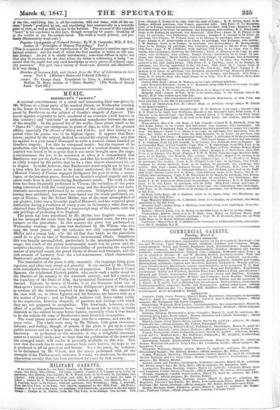MUSIC.
BEETHOVEN'S "EGMONT."
A musical entertainment of a novel and interesting kind was given by Mt... Wilson, to a large party of his musical friends, on Wednesday evening, at-his house in Gower Street. It consisted of the celebrated music com- posed by Beethoven on the subject of Goethe's tragedy of Egmont. This music appears originally to have consisted of an overture (well known in this country) and "entr'acte" or orchestral symphonies between the acts of the tragedy. In the general list of his works, these pieces stand as his "Opera 84 ": they are contiguous, in point of date, to some of his greatest efforts, especially The Mount of Olives and Fidelio; and thus belong to a period when his genius was in its highest vigour. It appears that Beet- hoven, excited by the subject, desired to extend his original ideas; and that he applied to a poet named Mosengeil to write a musical drama founded on Goethe's tragedy. For this he composed music: but the expense of its production (for which the complete resources of a musical theatre were re- quisite) was found to be so great that it was never brought upon the stage; a circumstance the less to be wondered at when it is remembered that Beethoven was not the fashion at Vienna, and that his beautiful Fidelio was so vilely treated by the public that he for a time almost abandoned his art in disgust. In order, however, that Beethoven's music might not be lost, at a time when his genius came to be better understood, the Musik Verein (Musical Union) of Vienna engaged Grillparzer the poet to write a mono- logue, or declamatory poem, founded on Goethe's original tragedy and the opera made from it, and introducing Beethoven's music. The work in this form has' been frequently performed in Vienna; the recitation of the poem being intermixed with the vocal pieces sung, and the descriptive and melo- dramatic movements performed by an orchestra. Grillparzer's poem, not having been published, has never been heard nor the music performed, ex- cept at 'Vienna: but Mr. Robert Miller, one of the most accomplished of our pianists, (who was a favourite pupil of Hummel, and has acquired great distinction during a residence of many years in Germany,) some time ago obtained from Grillparzer himself a manuscript copy of the poem, with the sole-privilege of producing it in England.
he poem has been translated by Mr. Milner into English verse; and he has arranged the music from the original orchestral score, for two per- formers on the pianoforte. In this manner the piece was performed on Wednesday -evening: the poem was declaimed by Mr. Wilson, who also sang the vocal pieces; and the orchestra was ably represented by Mr. Miller and a young lady, who did all that four hand. on the pianoforte could do to give an idea of Beethoven's instrumental effects. Sometimes this was happily accomplished, particularly in the accompaniments to the songs; but much of the purely instrumental music lost its power and de- scriptive character, from the utter impossibility of producing the requisite masses of physical sound, the grand bursts of drums and trumpets, and the rich streams of harmony from the wind-instruments, which characterize Beethoven's orchestral music.
The translation of the poem is ably executed; the language being pure, vigorous, and often very sweet and graceful. It was recited by Mr. Wilson with remarkable force as well as variety of expression. The hero is Count Egmont, the celebrated Flemish patriot, who made such a noble stand for the liberties of his country in the sixteenth century, and fell a victim to the treachery of the Duke of Alba, the tyrannical lieutenant of Philip the Second. Egmont, by means of Goethe, is to the Germans what one of Shakspere's heroes is to us; and, for them, Grillparzer's poem is calculated to awaken all the interest inspired by the tragedy. But this cannot be the case with us, to whom Egmont and his fortunes are known only as a dry matter of history; and an English audience will listen rather coldly to the expression, however eloquent, of passions and feelings with which they are not prepared to sympathize. This drawback, however, to the effect of a public performance here, would be most felt at first; it would diminish as the subject became better known, especially when it was found to be the vehicle for some of Beethoven's most beautiful conceptions.
The vocal pieces consist of four songs, two for a soprano, and two for a tenor voice. The whole were sung by Mr. Wilson, with great sweetness, delicacy, and feeling; though, of course, if the piece is got up in a more public manner and on a larger scale, the addition of a soprano voice will be necessary. As performed on this occasion, it was a delightful entertain- ment to a musical circle; and we hope that the publication of the poem and the arranged music will render it generally available in this way. But, now that the work has in some measure been made known, we hope to see it produced in all its grandeur and beauty. Were the poem, for instance, to be declaimed by Mr. Wilson, and the music performed with all the strength of the Philharmonic orchestra, it would, we doubt not, be the most interesting novelty that has been produced for years by that society.


























 Previous page
Previous page